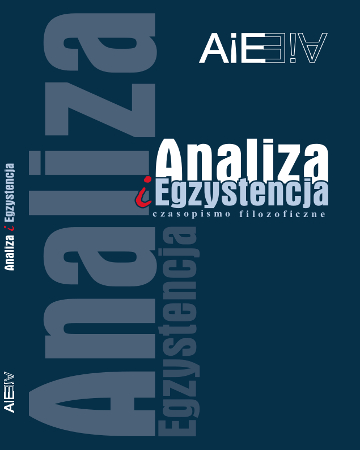
ISSN: 1734-9923
eISSN: 2300-7621
OAI
DOI: 10.18276/aie.2016.33-02






Issue archive /
33 (2016)
De Anima Arystotelesa oczami Franza Brentano. Budowa ludzkiej duszy na podstawie Die Psychologiedes Aristoteles, insbesondere seine Lehre vom nous poietikos oraz w kontekście pozostałych prac ze zbioru Aristotelica
(Aristotle’s De Anima according to Franz Brentano. The structure of human soul in The Psychology of Aristotle. In Particular His Doctrine of the Active Intellect and in the context of the other works from the Aristotelica Collection)
| Authors: |
Sonia
Kamińska
Uniwersytet Szczeciński |
| Keywords: | god immortality intellectual soul levels of the soul soul Aristotelica Aristotle Brentano |
| Data publikacji całości: | 2016 |
| Page range: | 20 (31-50) |
Abstract
This paper is a part of a project devoted to Brentano’s Aristotelian writings. I concentrate on his habilitation about Aristotle’s psychology, and especially on how he understood Aristotle’s division of mental life into three levels as well as the functions typical for these levels. I analyze two notions that Brentano introduces in his account: Zwischenglieder, meaning intermediary “levels” within the soul enabling smooth passages between the vegetative soul and sensory soul and between the latter and intellectual soul; and Gottverwandtschaft, i.e. human kinship with God, which is possible thanks to the noblest part of the soul. I also introduce two metaphors of the soul: cake-metaphor and fabric-metaphor.
Download file
Article file
Bibliography
| 1. | Albertazzi, L. (2006). Immanent Realism. An introduction to Brentano. Dordrecht: Springer. |
| 2. | Arystoteles (1941). Nicomachean Ethics. New York: Random House. |
| 3. | Arystoteles (1996). Metafizyka. Lublin: RW KUL. |
| 4. | Arystoteles (2003a). O duszy. Warszawa: Wydawnictwo Naukowe PWN. |
| 5. | Arystoteles (2003b). O rodzeniu się zwierząt. Warszawa: Wydawnictwo Naukowe PWN. |
| 6. | Arystoteles (2008). Etyka nikomachejska. Warszawa: Wydawnictwo Naukowe PWN. |
| 7. | Arystoteles (2009). Metafizyka. Warszawa: Wydawnictwo Naukowe PWN. |
| 8. | Brentano, F. (1867). Die Psychologie des Aristoteles, insbesondere seine Lehre vom Nous Poietikos. Mainz: Verlag von Franz Kirchheim. |
| 9. | Brentano, F. (1911). Aristoteles Lehre vom Ursprung des menschlichen Geistes. Leipzig: Verlag von Veit & Comp. |
| 10. | Brentano, F. (1977). The Psychology of Aristotle. In Particular His Doctrine of the Active Intellect. Berkeley–Los Angeles–London: University of California Press. |
| 11. | Brentano, F. (1978). On the Several Senses of Being in Aristotle. Berkeley: University of California Press. |
| 12. | Brentano, F. (1980). Aristoteles Lehre vom Ursprung des menschlichen Geistes. Hamburg: Meiner Verlag. |
| 13. | Brentano, F. (1986). Über Aristoteles. Hamburg: Meiner Verlag. |
| 14. | Brentano, F. (1999). Psychologia z empirycznego punktu widzenia. Warszawa: Wydawnictwo Naukowe PWN. |
| 15. | Brentano, F. (2008). Psychologie vom empirischen Standpunkt. Von der Klassifikation der psychischen Phänomene. Frankfurt am Main: Ontos-Verlag. |
| 16. | Brentano, F. (2012). Arystoteles i jego światopogląd. Kraków: Wydawnictwo Księgarnia Akademicka. |
| 17. | Huemer, W. (2010). „Franz Brentano”. The Stanford Encyclopedia of Philosophy (Fall 2010 Edition). Ed. E.N. Zalta. Pobrane z: http://plato.stanford.edu/ archives/fall2010/entries/brentano. |
| 18. | George, R., Koehn, G. (2006). Brentano’s Relation to Aristotle. W: D. Jacquette (ed.), The Cambridge Companion to Brentano (s. 20–44). Cambridge: CUP. |
| 19. | Jacquette, D. (2006). Brentano’s Concept of Intentionality. W: D. Jacquette (ed.), The Cambridge Companion to Brentano (s. 98–130). Cambridge: CUP. |
| 20. | Kamińska, S. (2010), Arystoteles według Franza Brentano. Dyskusyjna interpretacja/ Komentarz do przekładu fragmentu dzieła F. Brentany Aristoteles und seine Weltanschauung. Kwartalnik Filozoficzny, XXXVIII (1), 145–153. |
| 21. | Kamińska, S. (2012a). What can grow from the Divine Seed? The Divinity of Human Beings According to Aristotle. Studia Religiologica, 45 (3), 173–182. |
| 22. | Kamińska, S. (2012b). Nieznane oblicze Franza Brentano. W: F. Brentano, Arystoteles i jego światopogląd (s. 5–22). Kraków: Księgarnia Akademicka. |
| 23. | Kamińska, S. (2012c). Arystoteles i jego światopogląd? Zeszyty Naukowe Towarzystwa Doktorantów UJ, 5 (2), 11–31. |
| 24. | Kamińska, S. (2013). Wybrane aspekty wielorakiego znaczenia bytu i intencjonalności w ujęciu Franza Brentana i Martina Heideggera. Argument: Biannual Philosophical Journal, 2 (3), 253–271. |
| 25. | Kamińska, S. (2014a). The Alleged Activity of Active Intellect – a Wild Goose Chase or a Puzzle to Be Solved? Zagadnienia Filozo czne w Nauce, LIV, 79–126. |
| 26. | Kamińska, S. (2014b). Franz Brentano and His Competing World Views. A Philosopher’s Choice Between Science and Religion. Studia Religiologica, 47 (4), 285–294. |
| 27. | Kamińska, S. (2014c). Two Views on Intentionality, Immortality and Self in Brentano’s Philosophy of Mind. Polish Journal of Philosophy, VIII (2), 25–42. |
| 28. | Reale, G. (2001). Historia filozofii starożytnej. T. 2. Lublin: RW KUL. |
| 29. | Ross, W.D. (1995). Aristotle. Londyn–Nowy Jork: Roultedge. |
| 30. | Swieżawski, S. (1948). Centralne zagadnienie tomistycznej nauki o duszy (Commensuratio animae ad hoc corpus). Przegląd Filozo czny, XLIV (1–3), 131–191. |
| 31. | Swieżawski, S. (2002). Święty Tomasz na nowo odczytany. Poznań: W drodze. Tomasz z Akwinu (1963–1965). Suma teologiczna. Londyn: Veritas. |
| 32. | Tomasz z Akwinu (1981). O bycie i istocie. Lublin: RW KUL. |
| 33. | Zeller, E. (1882). Die Philosophie der Griechen in ihrer geschichtlichen Entwicklung. Lipsk: Fue’s Verlag. |